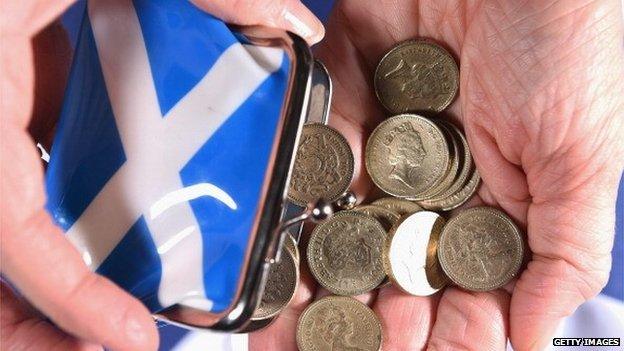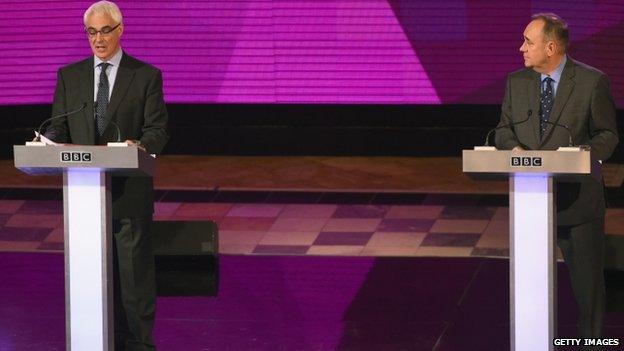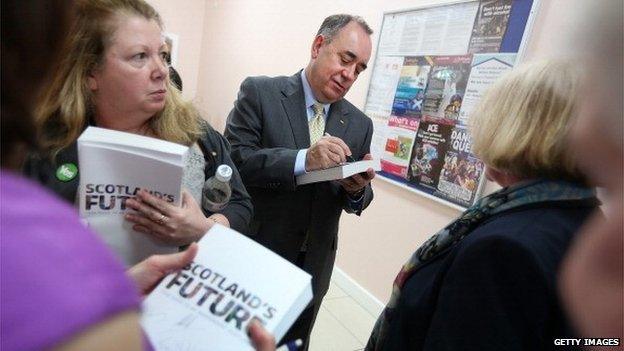Scottish independence: Does the currency clash matter?
- Published

The pound has been a big issue throughout the battle for Scottish votes in the independence referendum, but increasingly it dominates the debate above all else. Why does it matter?
The Scottish government - led by First Minister Alex Salmond - is certainly clear on its Plan A, which is that it intends to negotiate to continue to share the pound with the rest of the UK in a formal currency union.
One reason Mr Salmond feels confident that will happen is he and his colleagues have said they could refuse to take on a share of the national debt if the UK refused to share assets such as sterling.
But the current UK government and the Better Together campaign, led by Labour's Alistair Darling, don't accept that analysis and insist there will be no deal.
Mr Darling took the opportunity of the first TV debate, aired on STV and online on 5 August, to challenge Mr Salmond repeatedly for a Plan B.
The first minister initially said he would not compromise his negotiating position by being drawn on this, insisting that "it's our pound too and we're keeping it".
There are other options - the euro, a separate Scottish currency or Scotland goes ahead and uses the pound without formal agreement, which is known as sterlingisation.
But the Scottish government has already said it does not favour the euro. Mr Salmond has often stated sterlingisation would only be a suitable "transitional" arrangement. And he's said those who would prefer Scotland to switch to "our own currency" would have to win support for that in an election.
Mr Salmond stated he wished he had explained his position "in more detail" after the first TV debate.

Currency was just as firmly centre-stage in the second debate as it was in the first.
It was no surprise, therefore, that when they faced each other at the podium in a second TV debate, Mr Darling raised the spectre of Plan B yet again.
"I think the currency union would be bad for Scotland because our budget would have to be approved not by us, but what would then be a foreign country. It wouldn't be best for the rest of the country either," he said.
He also stressed that for the rest of the UK it would be a "huge risk" to keep a currency union with the Bank of England as lender of last resort.
'Fundamental'
This time the first minister revealed there was not one Plan B but three.
Mr Salmond told viewers: "We could have a Scottish currency. We could have a flexible currency like Sweden or Norway has. We could have a fixed rate Scottish pound attached to the pound sterling. That's what Denmark does with the euro and Hong Kong does with the dollar."
Asked to choose between these options, Mr Salmond stuck by his preferred Plan A, saying no-one could stop Scotland using the pound and no chancellor would let Scotland get away with escaping its share of the UK debt liabilities.
"We don't need permission to use our own currency. The argument actually is that they will deny us the assets of the Bank of England. The reason that won't happen is that if you deny us the financial assets, then the UK will get stuck with all of the liabilities," he said.
However Mr Darling argued: "If your first message in the world is here we are, here is Scotland, and by the way we've just defaulted on our debt, what do you think that would do to people who are lending us money in the future? Nobody would lend us any money in the future."
The question of currency is far from academic, according to Dr Brad Mackay of the University of Edinburgh's Business School.
"Currency is the fundamental question in this debate. It's central to everything from interest rates and borrowing costs for businesses to the return people get on their pensions.
"The uncertainty makes it very difficult for businesses to reach long-term investment decisions about Scotland. It limits their ability to to model what resources are needed in terms of jobs, overheads and capital," he said.
'Hammering away'
There may also be a political reason why the pound keeps coming up.
James Millar, political correspondent for the Sunday Post, says that Mr Darling "has obviously chosen to keep hammering away at that issue because it's one where Salmond is perceived as weak".
He added that the first minister's supporters will be pleased with his showing in round two, since he managed to "appear more confident on currency" and to "make life uncomfortable for Mr Darling" by getting him to acknowledge that Scotland could keep using the pound (albeit without a currency union).
The second debate yielded another new tack on the currency issue - not on Plans A, B, or C, but on how the first minister sees his role in the event of a "Yes" vote.

Is a Yes vote a Yes to independence, or the White Paper, or both?
More than once, Mr Salmond argued that a "Yes" would give him the mandate to represent "the sovereign will of the Scottish people" by lobbying for a currency union in the negotiations that would sort out the details of independence.
As BBC Scotland political editor Brian Taylor has blogged, this relies on the argument that a vote for Yes is not just an endorsement of independence but for the policies set out in detail in the White Paper, including a sterling union.
It's a reminder that although the first minister fronts the Yes campaign, it is a wider movement than the SNP. Prominent pro-independence voices such as that of Yes Scotland chairman Dennis Canavan, a former Labour MP and independent MSP who argues that independence could help secure the election of a Labour government in Scotland, disagree. He favours a new currency.
On this point, Mr Darling said: "Yes, there is the sovereign will of the Scottish people but there's also the sovereign will of the rest of the UK. Both sides have to agree."
Millar thinks there may be more mentions of a mandate to come.
"While the currency bunfight is not going away, disagreement over what Mr Salmond does and does not have a mandate to do could be in vogue over the last three weeks of the campaign," he says.


A referendum on whether Scotland should become independent is to take place
People resident in Scotland will be able to take part in the vote, answering the "yes/no" question: "Should Scotland be an independent country?"
The referendum will take place on Thursday, 18 September 2014
Go to the BBC's Scotland Decides page for analysis, background and explainers on the independence debate.
